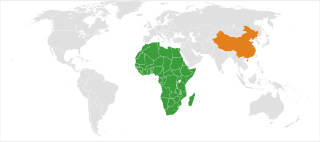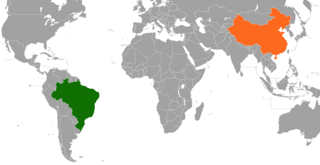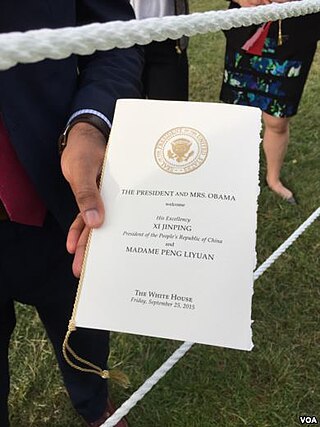Related Research Articles

China, officially the People's Republic of China (PRC), has full diplomatic relations with 180 out of the other 192 United Nations member states, Cook Islands, Niue and the State of Palestine. As of 2024, China has had the most diplomatic missions of any state.

The relationship between the People's Republic of China (PRC) and the United States of America (USA) has been complex and at times tense since the establishment of the PRC and the retreat of the government of the Republic of China to Taiwan in 1949. Since the normalization of relations in the 1970s, the US–China relationship has been marked by numerous perennial disputes including the political status of Taiwan, territorial disputes in the South China Sea, and more recently the treatment of Uyghurs in Xinjiang. They have significant economic ties and are significantly intertwined, yet they also have a global hegemonic great power rivalry. As of 2024, China and the United States are the world's second-largest and largest economies by nominal GDP, as well as the largest and second-largest economies by GDP (PPP) respectively. Collectively, they account for 44.2% of the global nominal GDP, and 34.7% of global PPP-adjusted GDP.

The Forum on China–Africa Cooperation (FOCAC) is an official forum between the People's Republic of China and all states in Africa with the exception of the Kingdom of Eswatini. It is the primary multi-lateral coordination mechanism between African countries and China and since 2018 is viewed by those countries as a cooperation platform within the Belt and Road Initiative.
Sino-Third World relations refers to the general relationship between the two Chinese states across the Taiwan Strait and the rest of the Third World.

Chinese-Laotian relations refers to the current and historical relationship between Lao People's Democratic Republic and the People's Republic of China.

Relations between Vietnam and China had been extensive for a couple of millennia, with Northern Vietnam especially under heavy Sinosphere influence during historical times. Despite their Sinospheric and socialist background, centuries of conquest by modern China's imperial predecessor as well as modern-day tensions have made relations wary. The People's Republic of China (PRC) ruled by the Chinese Communist Party (CCP) assisted North Vietnam and the Communist Party of Vietnam (CPV) during the Vietnam War whilst the Taiwan-based Republic of China (ROC) was allied with South Vietnam.

Governmental relations between the People's Republic of China (PRC) and the Republic of Namibia were first established the day after Namibia's independence, but relations with Namibian independence movements date back to the 1960s.

Sino–African relations, also referred to as Africa–China relations or Afro–Chinese relations, are the historical, political, economic, military, social, and cultural connections between China and the African continent.

Brazil–China relations are the current and historical relationship between Brazil and China. Relations between Brazil and China began in the early nineteenth century and continued until 1949, when they were disrupted by the creation of the People's Republic of China (PRC). Diplomatic relations between the PRC and Brazil officially began in 1974 with agreement on the establishment and operation of Brazil's embassy in Beijing and China's embassy in Brasília. Since then, bilateral ties have developed mostly based on non-interference, equality, and mutual benefit (win-win).

The International Department of the Central Committee of the Chinese Communist Party, also known as the International Liaison Department (ILD), is an agency under the Central Committee of the Chinese Communist Party in charge of establishing and maintaining relations with foreign political parties and other foreign organizations.

BRICS is an intergovernmental organization comprising Brazil, Russia, India, China, South Africa, Iran, Egypt, Ethiopia, and the United Arab Emirates. Originally identified to highlight investment opportunities, the grouping evolved into an actual geopolitical bloc, with their governments meeting annually at formal summits and coordinating multilateral policies since 2009. Bilateral relations among BRICS are conducted mainly based on non-interference, equality, and mutual benefit.
Paul Thomas Haenle is an American analyst and China specialist currently serving as Maurice R. Greenberg Director’s Chair at the Carnegie Endowment for International Peace.

The Belt and Road Initiative, known in China as the One Belt One Road and sometimes referred to as the New Silk Road, is a global infrastructure development strategy adopted by the Chinese government in 2013 to invest in more than 150 countries and international organizations. The BRI is composed of six urban development land corridors linked by road, rail, energy, and digital infrastructure and the Maritime Silk Road linked by the development of ports.

The 2015 state visit of Xi Jinping to the United States, which was from September 22 to 28, 2015, was the state visit of China's paramount leader Xi Jinping to the United States. It was his seventh visit to the United States and his first visit after succeeding the General Secretary of the Chinese Communist Party in 2012. During his visit, Xi attended the US–China Internet Industry Forum, met US President Barack Obama and attended the 70th anniversary of the United Nations.

The Kim–Xi meetings were a series of summits between North Korea and China during 2018 and 2019. North Korean supreme leader Kim Jong Un secretly met with Chinese paramount leader Xi Jinping on March 25–28, 2018. Xi made a classified invitation to Kim to visit China, after which Kim visited Beijing and used his bullet proof train to travel to the three-day meeting. It is his first known out-of-country diplomatic trip since taking power. Kim and Xi had a second surprise meeting on May 7–8, 2018 in the city of Dalian. Kim and Xi had a third surprise meeting on June 19–20, 2018. They had a fourth surprise meeting on January 7–10, 2019 in Beijing, followed by a fifth official DPRK and China summit June 20–21, 2019 in the Forbidden City, Pyongyang.

Community of common destiny for mankind, officially translated as community with a shared future for mankind or human community with a shared future, is a political slogan used by the Chinese Communist Party (CCP) to describe a stated foreign-policy goal of the People's Republic of China. The phrase was first used by former CCP General Secretary Hu Jintao and has been frequently cited by current General Secretary Xi Jinping. As the term's usage in English has increased, "shared future" has become more frequently used than "common destiny," as the latter arguably implies a predetermined path. The phrase was included in the CCP Constitution in 1997, and the preamble of the Constitution of the People's Republic of China when the Constitution was amended in 2018.
The People's Republic of China emerged as a great power and one of the three big players in the tri-polar geopolitics (PRC-US-USSR) during the Cold War, after the Korean War in 1950-1953 and the Sino-Soviet split in the 1960s, with its status as a recognized nuclear weapons state in 1960s. Currently, China has one of the world's largest populations, second largest GDP (nominal) and the largest economy in the world by PPP.
The foreign policy of Xi Jinping concerns the policies of the People's Republic of China's Xi Jinping with respect to other nations. Xi became the General Secretary of the Chinese Communist Party in 2012 and became the President of the People's Republic of China in 2013.
The foreign policy of the Joe Biden administration emphasizes the repair of the United States' alliances, which Biden argues were damaged during the Trump administration. The administration's goal is to restore the United States to a "position of trusted leadership" among global democracies in order to address challenges posed by Russia and China. Both Biden and his Secretary of Defense Lloyd Austin have repeatedly emphasized that no other world power should be able to surpass the United States, either militarily or economically. Biden's foreign policy has been described as having ideological underpinnings in mid-twentieth century liberal internationalism, American exceptionalism, and pragmatism.

Elizabeth C. Economy is an American political scientist, foreign policy analyst, and expert on China's politics and foreign policy. She was a Senior Advisor for China to the Secretary of Commerce in the Biden administration and Senior Fellow at the Hoover Institution at Stanford University.
References
- ↑ "Xi Courts Africa With $50 Billion Pledge, Military Support". Bloomberg.com. 2024-09-04. Retrieved 2024-09-19.
- ↑ Lim, Min Zhang (2024-09-05). "Xi Jinping reiterates China's commitment to Africa amid economic slowdown". The Straits Times. ISSN 0585-3923 . Retrieved 2024-09-19.
- ↑ "Japan seeks to counter China in Africa with 'high-quality' alternative". South China Morning Post. 2019-08-18. Retrieved 2024-09-19.
- ↑ Kuo, Kaiser Y. (2024-09-12). "Eric Olander on China in the Global South". www.sinicapodcast.com. Retrieved 2024-09-19.
- ↑ "Mosaic of China Season 01 Episode 03 – The China/Africa Correspondent (Eric OLANDER, The China Africa Project)". SHINE. Retrieved 2024-09-19.
- ↑ "Publishing in one of the world's most demanding environments - Vietnam". FIPP. 2016-09-26. Retrieved 2024-09-19.
- ↑ Hvistendahl, Mara; Dong, Joy (September 4, 2024). "China Woos Africa, Casting Itself as Global South's Defender". The New York Times .
- ↑ Pierson, David; Chutel, Lynsey (August 23, 2023). "China Tries to Increase Its Clout in Africa Amid Rivalry With the U.S." The New York Times .
- ↑ Bariyo, Nicholas; Wong, Chun Han (June 21, 2022). "China Seeks to Expand Africa Trade Dominance With Role as Peace Mediator". The Wall Street Journal .